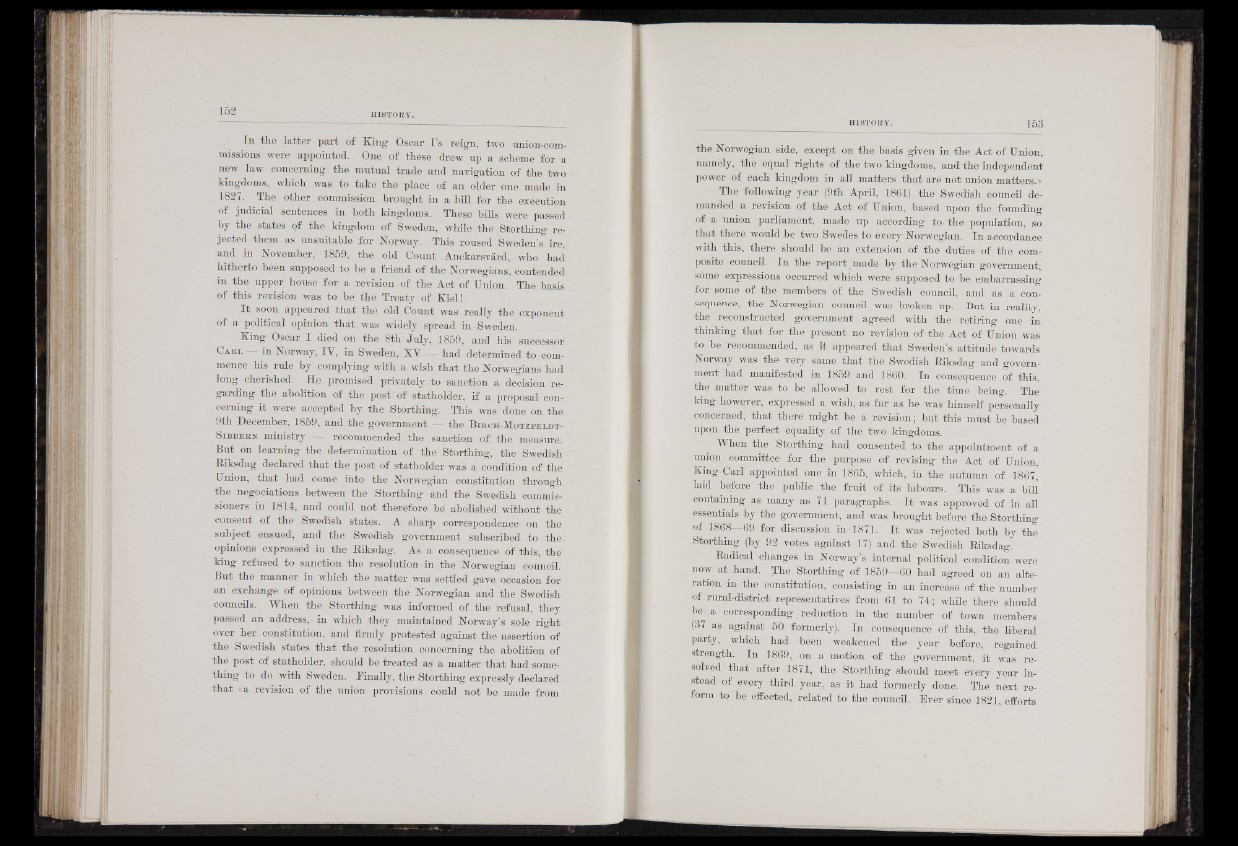
In the latter part of King Oscar I ’s reign, two union-commissions
were appointed. One of these drew np a scheme for a
new law concerning the mutual trade and navigation of the two
kingdoms, which was to take the place of an older one made in
1827. The other commission brought in a bill for the execution
of judicial sentences in both kingdoms. These bills'were passed
by the states Qf the kingdom of Sweden, while the Storthing rejected
them as unsuitable for Norway. This roused Sweden’s ire,
and in November, 1859, the old Count Anckarsvàrd, who had
hitherto been supposed to be a friend of the Norwegians, contended
in the upper house for a revision of the Act of Union. The basis
of this revision was to be the Treaty of Kiel!
I t soon appeared that the old Count was really the exponent
of a political opinion that was widely spread in Sweden.
King Oscar I died on the 8th July, 1859, and his successor
C a r l in Norway, IN, in Sweden, X V i,.;, had determined to commence
his rule by complying with a wish that the Norwegians had
long cherished. He promised privately to sanction a decision regarding
the abolition of the post of statholder, if a proposal concerning
it were accepted by the Storthing. This was done on the
9th December, 1859, and the government — the Hi r g h \ I o t z k k i ,i> t -
S i b b e r h ministry E f l recommended the sanction of the measure.
But on learning the determination of the Storthing, the Swedish
Riksdag declared that the post of statholder was a condition of the
Union, that had come into thé Norwegian constitution through
the négociations between the Storthing and the Swedish commissioners
in 1814, and could not therefore be abolished without the
consent of the Swedish states. A sharp correspondence on the
subject ensued, and the Swedish government subscribed to the.
opinions expressed in the Riksdag. As a consequence of this, the
king refused to sanction the resolution in the Norwegian council.
But the manner in which the matter was settled gave occasion for
an exchange of opinions between the Norwegian and the Swedish
councils. When the Storthing was. informed of the refusal, they
passed an address, in which they maintained Norway’s sole right
over her constitution, and firmly protested against the assertion of
the Swedish states that the resolution concerning the abolition of
the post of statholder, should be treated as a matter that had something
to do with Sweden. Finally, the Storthing expressly declared
that «a revision of the union provisions could not be made from
the Norwegian side, except on the basis given in the Act of Union,
namely, the equal rights of the two kingdoms, and the independent
power of each kingdom in all matters that are not union matters.»
The following year (9th April, 1861) the Swedish council demanded
a revision of the Act of Union, based upon the founding
of a union parliament, made up according to. the population, so
that there would be two Swedes to every Norwegian. In accordance
with this, there should be an extension of the duties of the composite
council. In the report made by the Norwegian government,
some expressions occurred which were supposed to be embarrassing
for some of the members of the Swedish council, and as a consequence,
the Norwegian council was broken up. But in reality,
the reconstructed government agreed with the retiring one in
thinking that for the present no revision of the Act of Union was
to be recommended, a s j t appeared that Sweden’s attitude towards
Norway was the very same that the Swedish Riksdag and government
had manifested in' 1859 and 1860. In consequence of this,
the matter was to be allowed to rest for the time being. The
king however, expressed a wish, as far as he was himself personally
concerned, that, there might be a revision; but this must be based
upon the perfect equality of the two kingdoms.
When the Storthing had consented to the appointment of a
union committee for the purpose of revising the Act of Union,
King Carl appointed one in 1865, which, in the autumn of 1867,
laid before the public the fruit of its labours. This was a bill
containing as many as 71 paragraphs. I t was approved of in all
essentials by the government, and was:brought before the Storthing
of 1868—69 for discussion in 1871. I t was rejected both by the
Storthing (by 92 votes against .17) and the Swedish Riksdag.
Radical changes in Norway’s internal political condition were
now at. hand. The Storthing of 1859—60 had agreed on an alteration
in the constitution, consisting in an increase of the number
of rural-district representatives from 61 to 74; while there should
be- a corresponding reduction in the number of town members
(37 as against 50 formerly};- In consequence of this, the liberal
party, which had been weakened the year before, regained
strength. In 1869, on a motion of the government, it was resolved
that after 1871, the Storthing should meet every year instead
of every third year, as it had formerly done. The next reform
to be effected, related to the council. Ever since 1821, efforts